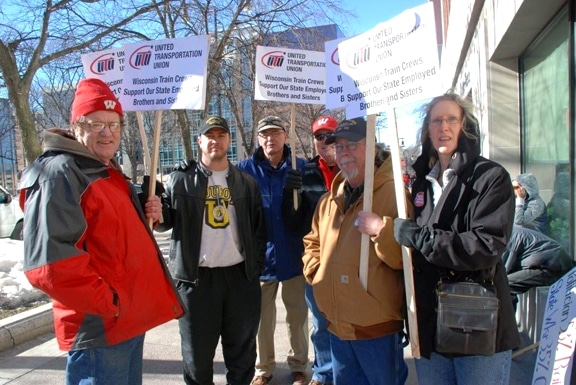By UTU International President Mike Futhey
The right of workers to join a labor union and bargain collectively with employers over wages, benefits and working conditions is the foundation of workplace democracy.
Brave and dedicated trade unionists before us risked their lives, freedom and economic security fighting for collective bargaining rights, achieving victory first in 1926 with passage of the Railway Labor Act, and then the National Labor Relations Act in 1935.
For public-sector workers, the struggle took longer. Wisconsin was the first state to grant its workforce a right of collective bargaining in 1959. Federal workers gained a collective bargaining right in 1962.
It is ironic that Wisconsin was the first state to sanction public-employee collective bargaining because it is Wisconsin’s governor who this month invited massive civil unrest in his state by attempting to revoke that right.
Similar legislative efforts are underway in Ohio and Tennessee, and the movement to curtail public-employee collective bargaining rights could spread.
If the effort is successful, private-sector workers could then find their own collective-bargaining rights under attack. We are witnessing in Congress and in many state legislatures an anti-union animus stronger than it has been in decades.
To close our eyes to the struggle of state workers in Wisconsin, Ohio or elsewhere is to wake up finding our own collective bargaining rights gone.
That is why union members from across America — many from the United Transportation Union — have been participating in rallies, telephone and email communications efforts, petition drives and other activities in support of public employees whose collective bargaining rights are under attack.
Wisconsin State Legislative Director Tim Deneen and Ohio State Legislative Director Glenn Newsom are coordinating joint action with the targeted public-employee unions.
As a member of the AFL-CIO Executive Committee, I am working with the federation’s Transportation Trades Department to identify additional actions that might be taken to assist in fighting state attempts to restrict or eliminate public-employee collective bargaining.
The outrage is not that public employees must participate — with all segments of society — to close massive budget shortfalls.
The outrage is that Wisconsin Gov. Scott Walker wants to revoke the right of public employees to bargain over health care, pensions and working conditions, plus Scott wants to impose significant costs on workers and their unions by requiring annual representational elections and cancelling the state’s collection of union dues through payroll deduction.
This is all about union busting and not about closing budget shortfalls.
In fact, Christopher Policano, an official with the American Federation of State, County and Municipal Employees, said the union is willing to negotiate concessions with Gov. Walker, “but he wants to throw out the bargaining table.”
Wisconsin is not the only state with a big budget deficit. By contrast, in California, Michigan, New York and Pennsylvania, governors are collectively bargaining with state employees to find the least painful alternatives to balance state budgets.
In Pennsylvania, a spokesperson for Gov. Tom Corbett, a Republican, told The New York Times, “We’ll begin negotiations with the public-sector unions and anticipate we’ll conduct those in good faith.”
Many UTU members have inquired how they might join in solidarity with public employees under siege.
Begin with an AFL-CIO sponsored website, “States of Denial,” which provides opportunities for different levels of involvement. Click below to link to the “States of Denial” website:
www.aflcio.org/issues/states/
Click on the following link to see how you might help in Ohio:
https://www.smart-union.org/news/help-preserve-collective-bargaining-in-ohio/
And certainly consider joining, or increasing your contribution to, the UTU PAC, which works to elect union-friendly lawmakers to state legislatures and Congress.
